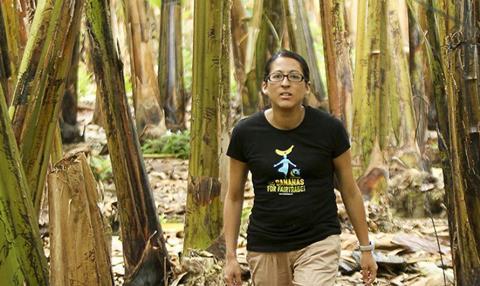As Fairtrade launches its new offer to commercial partners in banana supply chains, Fairtrade International’s senior advisor for bananas Silvia Campos explains why sustainable prices are the key to a sustainable future

To paraphrase Bill Clinton’s famous election slogan, “It’s the price, stupid!” The price we pay for bananas at the supermarket checkout has a ripple effect all the way up the supply chain to the workers and farmers who grow them. As the saying goes, price is everything.
If the price of bananas in our local supermarket seems too good to be true, then it probably is. Across Europe, bananas sell for as little as one euro per kilo. It’s a similar story in the USA, where a pound of bananas will cost you around 58 cents.
Despite the cost of living crisis making a slight dent in sales in 2022, the EU and US still account for around ten million tonnes of banana imports each year. We’re talking big business here - the value of the global banana market is forecast to grow from $140 billion in 2023 to $145bn by 2028. But - and it’s a big but - who benefits? And just how sustainable is the current banana supply chain in the long term?
Loss leaders
The eye-catching bright yellow fruit are often the first thing we see when we walk into a supermarket. They’re frequently priced as ‘loss leaders’ - deliberately sold at cost or even at a loss in order to entice us into the store. With retail prices regularly well below the real cost of production, it’s no surprise that the farmers and workers who actually grow them - often in difficult conditions - say their lives and their businesses are unsustainable.
Sustainability isn’t just about the environment. It also covers things like prices, profit margins, labour conditions and available work force. Without fair prices, decent wages and regard for human rights, the banana industry faces long-term decline. Add the climate, biodiversity and migration crisis into the mix, and you really have got a recipe for disaster.
More than 35,000 Fairtrade banana workers and producers rely for their livelihoods on 265 producer organisations around the world, but particularly in Latin America and the Caribbean and West Africa. They range from tiny family farms to large plantations, and although they are mostly better off than their conventional counterparts, they are by no means immune to these pressures.
They enjoy a degree of protection through the Fairtrade Minimum Price and the Fairtrade Premium - the extra sum of money earned for every box of bananas sold on Fairtrade terms. In 2021 we launched the Fairtrade Base Wage set at 70 per cent of the living wage benchmark - the minimum wage that a worker will receive in a Fairtrade banana plantation. Since 2015, farmers participating in our Productivity Improvement Programme have achieved an average 36 per cent of yield increase through improved farm practices. However, the Covid-19 pandemic and subsequent global economic slowdown have wiped out some of these gains.
A sustainable offer
That’s why Fairtrade has launched a new, sustainable offer to achieve living wages, living incomes and resilient banana supply chains. At the core of our new offer are three elements which play a crucial role in the trading of bananas - a newly-updated Fairtrade Minimum Price, a Living Wage Reference Price, and a brand-new Fairtrade Living Wage Differential. Together, they’re designed to make both living wages and resilient banana supply chains a reality.
We’re also offering our commercial partners a package of reporting and monitoring tools and continuously updated technical data. They’ll be able to measure how their commitment to pay a fair price is helping workers earn a living wage, and farmers and plantation owners to pay for sustainable practices on their farms.
Uniquely among global standards, Fairtrade workers decide for themselves, through democratically elected Premium Committees, how to spend the additional funds they get from selling on Fairtrade terms. Since 2015, €266 million Premium has been generated from banana sales, a proportion of which is used to top up plantation workers’ wages to the living wage benchmark.
Sustainable prices are the key to sustainable production. Banana growers must be confident they can sell enough volume at sufficient price in order to pay decent wages, invest in their farms, boost productivity and be resilient in the face of climate change. They need commitments from global traders - who currently hold the whip hand in negotiations - that they will pay a sustainable price over the long-term in order to cushion the impacts of volatile market fluctuations and to help them plan for the future.
Fairtrade’s new offer builds on more than 25 years of work to achieve justice for banana workers and producers. I’m confident it will prove to be a game-changer for workers, producers, traders and retailers - but we need many more commercial partners to buy into our vision of a fairer, more sustainable banana industry. There’s still a long way to go, but workers and producers on Fairtrade certified banana plantations can now look forward to a more secure future.



